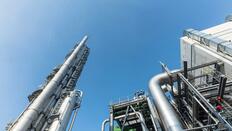- BASF's Ludwigshafen site includes ammonia (380,000 metric tons/year), methanol (165,000 metric tons/year), and melamine (51,000 metric tons/year) plants.
- The ammonia plant consumes 0.97 Tm3 of natural gas per ton of ammonia.
- The melamine plant uses 2.6 tons of urea crystal and 0.27 Tm3 of natural gas per ton of melamine.
- The methanol unit can be integrated into green methanol projects.

Agreement Overview
BASF and International Process Plants (IPP) have entered an agreement to market ammonia, methanol, and melamine plants located at BASF’s Verbund site in Ludwigshafen, Germany. These plants are available as part of BASF's structural measures to ensure competitiveness in the European market. Financial details of the deal have not been disclosed.
Production Capacities
The agreement includes integrated production assets for ammonia (380,000 metric tons/year), methanol (165,000 metric tons/year), and melamine (51,000 metric tons/year). IPP is offering these units for relocation and sale to qualified buyers looking for lower capex and shorter project execution timelines.
Efficiency and Consumption
The ammonia plant consumes 0.97 Tm3 of natural gas per ton of ammonia. The melamine plant uses 2.6 tons of urea crystal and 0.27 Tm3 of natural gas per ton of melamine. The methanol unit is a synthesis loop that can be used in green methanol projects with available green feedstocks.
Operational Context
BASF will continue to produce ammonia and methanol at other assets within the Ludwigshafen site. The idled plants were operational through 2023 and were shut down as part of the structural adaptation of BASF's production setup. The sale aims to sustain these well-maintained assets for chemical production in a more sustainable and economic manner.

